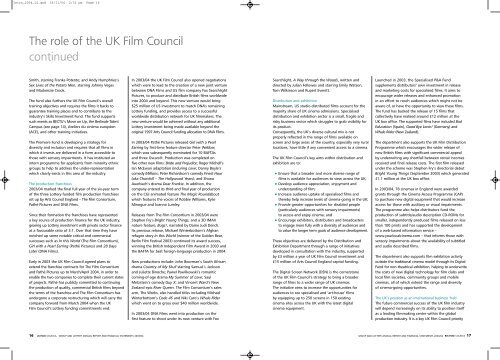04 Part 1 - BFI - British Film Institute
04 Part 1 - BFI - British Film Institute
04 Part 1 - BFI - British Film Institute
You also want an ePaper? Increase the reach of your titles
YUMPU automatically turns print PDFs into web optimized ePapers that Google loves.
Intro_20<strong>04</strong>_14.qxd 19/11/<strong>04</strong> 2:32 pm Page 16<br />
The role of the UK <strong>Film</strong> Council<br />
continued<br />
Smith, starring Franka Potente; and Andy Humphries’s<br />
Sex Lives of the Potato Men, starring Johnny Vegas<br />
and Mackenzie Crook.<br />
The fund also furthers the UK <strong>Film</strong> Council’s overall<br />
training objectives and requires the films it backs to<br />
guarantee training places and to contribute to the<br />
industry’s Skills Investment Fund. The fund supports<br />
such events as BECTU’s Move on Up, the Berlinale Talent<br />
Campus (see page 14), Ateliers du cinéma européen<br />
(ACE), and other training initiatives.<br />
The Premiere Fund is developing a strategy for<br />
diversity and inclusion and requires that all films in<br />
which it invests are delivered in a form accessible to<br />
those with sensory impairments. It has instituted an<br />
intern programme for applicants from minority ethnic<br />
groups to help to address the under-representation<br />
which clearly exists in this area of the industry.<br />
The production franchises<br />
2003/<strong>04</strong> marked the final full year of the six-year term<br />
of the three Lottery-funded film production franchises<br />
set up by Arts Council England – The <strong>Film</strong> Consortium,<br />
Pathé Pictures and DNA <strong>Film</strong>s.<br />
Since their formation the franchises have represented<br />
a key source of production finance for the UK industry,<br />
gearing up Lottery investment with private sector finance<br />
at a favourable ratio of 3:1. Over that time they have<br />
notched up some notable critical and commercial<br />
successes such as In this World (The <strong>Film</strong> Consortium),<br />
Girl with a Pearl Earring (Pathé Pictures) and 28 Days<br />
Later (DNA <strong>Film</strong>s).<br />
Early in 2003 the UK <strong>Film</strong> Council agreed plans to<br />
extend the franchise contracts for The <strong>Film</strong> Consortium<br />
and Pathé Pictures up to March/April 20<strong>04</strong>, in order to<br />
enable the two companies to complete their current slates<br />
of projects. Pathé has publicly committed to continuing<br />
the production of quality, commercial <strong>British</strong> films beyond<br />
the terms of the franchise and The <strong>Film</strong> Consortium has<br />
undergone a corporate restructuring which will carry the<br />
company forward from March 20<strong>04</strong> when the UK<br />
<strong>Film</strong> Council’s Lottery funding commitments end.<br />
16 GROUP AND LOTTERY ANNUAL REPORT AND FINANCIAL STATEMENTS 2003/<strong>04</strong><br />
In 2003/<strong>04</strong> the UK <strong>Film</strong> Council also opened negotiations<br />
which were to lead to the creation of a new joint venture<br />
between DNA <strong>Film</strong>s and US film company Fox Searchlight<br />
Pictures, to produce and distribute <strong>British</strong> films worldwide<br />
into 20<strong>04</strong> and beyond. This new venture would bring<br />
$25 million of US investment to match DNA’s remaining<br />
Lottery funding, and provides access to a successful<br />
worldwide distribution network for UK filmmakers. The<br />
new venture would be achieved without any additional<br />
Lottery investment being made available beyond the<br />
original 1997 Arts Council funding allocation to DNA <strong>Film</strong>s.<br />
In 2003/<strong>04</strong> Pathé Pictures released Girl with a Pearl<br />
Earring by first-time feature director Peter Webber,<br />
which was subsequently nominated for 10 BAFTAs<br />
and three Oscars®. Production was completed on<br />
five other new films: Bride and Prejudice; Roger Michell’s<br />
Ian McEwan adaptation Enduring Love; Danny Boyle’s<br />
comedy Millions; Peter Richardson’s comedy Finest Hour<br />
(aka Churchill – The Hollywood Years); and Shona<br />
Auerbach’s drama Dear Frankie. In addition, the<br />
company entered its third and final year of production<br />
on the CGI animated feature The Magic Roundabout<br />
which features the voices of Robbie Williams, Kylie<br />
Minogue and Joanna Lumley.<br />
Releases from The <strong>Film</strong> Consortium in 2003/<strong>04</strong> were<br />
Stephen Fry’s Bright Young Things, and a 3D IMAX<br />
nature feature, Bugs!, narrated by Dame Judi Dench.<br />
Its previous release, Michael Winterbottom’s Afghan<br />
refugee story In this World (winner of the Golden Bear,<br />
Berlin <strong>Film</strong> Festival 2003) continued its award success,<br />
winning the <strong>British</strong> Independent <strong>Film</strong> Award in 2003 and<br />
the BAFTA for best foreign-language production in 20<strong>04</strong>.<br />
New productions include: John Boorman’s South African<br />
drama Country of My Skull starring Samuel L Jackson<br />
and Juliette Binoche; Pawel Pawlikowski’s romantic<br />
coming-of-age drama My Summer of Love; Saul<br />
Metzstein’s comedy Guy X; and Vincent Ward’s New<br />
Zealand epic River Queen. The <strong>Film</strong> Consortium’s sales<br />
arm, The Works, also handled titles including Michael<br />
Winterbottom’s Code 46 and Niki Caro’s Whale Rider<br />
which went on to gross over $40 million worldwide.<br />
In 2003/<strong>04</strong> DNA <strong>Film</strong>s went into production on the<br />
first feature to shoot under its new venture with Fox<br />
Searchlight, A Way through the Woods, written and<br />
directed by Julian Fellowes and starring Emily Watson,<br />
Tom Wilkinson and Rupert Everett.<br />
Distribution and exhibition<br />
Mainstream, US studio-distributed films account for the<br />
majority share of UK cinema admissions. Specialised<br />
distribution and exhibition sector is a small, fragile and<br />
risky business sector which struggles to grab visibility for<br />
its product.<br />
Consequently, the UK’s diverse cultural mix is not<br />
properly reflected in the range of films available on<br />
screen and large areas of the country, especially very rural<br />
locations, have little if any convenient access to a cinema.<br />
The UK <strong>Film</strong> Council’s key aims within distribution and<br />
exhibition are to:<br />
● Ensure that a broader and more diverse range of<br />
films is available for audiences to view across the UK;<br />
● Develop audience appreciation, enjoyment and<br />
understanding of film;<br />
● Increase audience uptake of specialised films and<br />
thereby help increase levels of cinema-going in the UK;<br />
● Provide greater opportunities for disabled people<br />
(particularly audiences with sensory impairments)<br />
to access and enjoy cinema; and<br />
● Encourage exhibitors, distributors and broadcasters<br />
to engage more fully with a diversity of audiences and<br />
to value the longer term goals of audience development.<br />
These objectives are delivered by the Distribution and<br />
Exhibition Department through a range of initiatives<br />
developed in consultation with the industry, supported<br />
by £3 million a year of UK <strong>Film</strong> Council investment and<br />
£15 million of Arts Council England capital funding.<br />
The Digital Screen Network (DSN) is the cornerstone<br />
of the UK <strong>Film</strong> Council’s strategy to bring a broader<br />
range of films to a wider range of UK cinemas.<br />
The initiative aims to increase the opportunities for<br />
audiences to see specialised and ‘art-house’ films<br />
by equipping up to 250 screens in 150 existing<br />
cinema sites across the UK with the latest digital<br />
cinema equipment.<br />
Launched in 2003, the Specialised P&A Fund<br />
supplements distributors’ own investment in release<br />
and marketing costs for specialised films. It aims to<br />
encourage wider releases and enhanced promotion<br />
in an effort to reach audiences which might not be<br />
aware of, or have the opportunity to view these films.<br />
The fund has backed the release of 15 films that<br />
collectively have realised around £12 million at the<br />
UK box office. The supported films have included Bad<br />
Education (Spain), Good Bye Lenin! (Germany) and<br />
Whale Rider (New Zealand).<br />
The department also supports the UK <strong>Film</strong> Distribution<br />
Programme which encourages the wider release of<br />
new <strong>British</strong> films with significant commercial appeal<br />
by underwriting any shortfall between rental incomes<br />
received and final release costs. The first film released<br />
under the scheme was Stephen Fry’s directorial debut<br />
Bright Young Things (September 2003) which generated<br />
£1.1 million at the UK box office.<br />
In 2003/<strong>04</strong>, 78 cinemas in England were awarded<br />
grants through the Cinema Access Programme (CAP)<br />
to purchase new digital equipment that would increase<br />
access for those with auditory or visual impairments.<br />
The programme also helps distributors fund the<br />
production of subtitle/audio description CD-ROMs for<br />
smaller, independently produced films released on less<br />
than 100 prints and has supported the development<br />
of a web-based information service –<br />
www.yourlocalcinema.com – that informs those with<br />
sensory impairments about the availability of subtitled<br />
and audio described films.<br />
The department also supports film exhibition activity<br />
outside the traditional cinema model through its Digital<br />
Fund for non-theatrical exhibition, helping to underwrite<br />
the costs of new digital technology for film clubs and<br />
local film societies, community groups and mobile<br />
cinemas, all of which extend the range and diversity<br />
of cinema-going opportunities.<br />
The UK’s position as an international business ‘hub’<br />
The future commercial success of the UK film industry<br />
will depend increasingly on its ability to position itself<br />
as a leading filmmaking centre within the global<br />
production industry. It is a key UK <strong>Film</strong> Council priority<br />
GROUP AND LOTTERY ANNUAL REPORT AND FINANCIAL STATEMENTS 2003/<strong>04</strong><br />
17

















